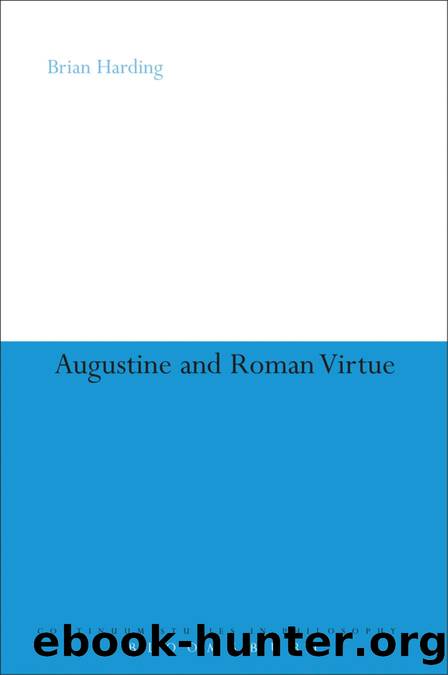Augustine and Roman Virtue by Harding Brian;

Author:Harding, Brian;
Language: eng
Format: epub
Publisher: Bloomsbury Publishing Plc
Published: 2019-11-23T00:00:00+00:00
Chapter 4
Augustineâs Critique of Roman Philosophical Virtue
1. Philosophy and the Desire for Glory
To speak of Augustineâs âcritique of philosophyâ is not to suggest a critique of the attempt to develop metaphysical or epistemological theories, nor should it be taken to suggest that Augustine inhabits some place outside of philosophy taking, as it were, pot shots at it. Augustineâs very language testifies to the fact that he understands his criticisms of ancient philosophy as philosophical: he describes Christianity as he understands it not as âfaithâ or even âtheologyâ but as âtrue philosophyâ or âour philosophyâ; when he speaks of philosophy simpliciter he is typically referring to his opponents. This terminology should not cause consternation: we can only expect that Augustine will think of his philosophy as the true philosophy just as much as we would expect Cato to think of Stoicism as the true philosophy. This already suggests that for Augustine the most salient difference between Christianity and the âother philosophiesâ is not faith versus reason but rather the true versus the false. In what follows, however, I will more-or-less follow Augustineâs usage, such that when the word âphilosophyâ appears I mean âpagan philosophyâ.1 Augustine argues that these philosophies are false insofar as they promise a happiness that they cannot provide: to show this, Augustine develops in book 19 a philosophical critique of the conception of philosophy, common to philosophic schools of late antiquity, as a path towards complete human happiness. Augustine is critiquing philosophy conceived of as an activity offering some sort of âsalvationâ wherein one could, through wisdom, save oneself. If Augustineâs critique is successful, then a reconception of philosophy is demanded. This rethinking of philosophy constitutes the fundamental problem of medieval philosophy: what purpose does philosophy serve when stripped of the originally eudemonistic context.
Nevertheless, despite his distaste for eudemonistic claims, Augustine would not approve of a purely theoretical âarmchairâ quest for knowledge stripped of its eudemonological component. This quest would be one of mere curiosity or concupiscence of the eyes.2 However, against the suspicion that this is simply a Christian distaste for pagan learning, we must hasten to add that Cicero also expresses reservations about purely theoretical speculation: we cannot mistake Augustineâs distaste for theory as fideist anti-intellectualism but rather should locate it within the Roman tradition of practical philosophy that appropriates Greek thought with an eye primarily towards its ethical content.3 Cicero goes so far as to suggest that Platoâs Socrates, who lived a private contemplative life avoiding politics entirely, although not inflicting injustice upon anyone was âpassivelyâ unjust, insofar as he did not actively seek to prevent injustices.4 In approaching his critique of philosophical virtue, one must be careful to avoid the Kantian presuppositions described in Chapter 1 which would force us to see Augustineâs critique of philosophy solely in terms of the heteronymous influence of faith on reason. The analysis of philosophy in The City of God seeks to discredit the pretensions of philosophy to offer happiness by showing the impossibility of happiness.
Augustineâs account of
Download
This site does not store any files on its server. We only index and link to content provided by other sites. Please contact the content providers to delete copyright contents if any and email us, we'll remove relevant links or contents immediately.
| Deconstruction | Existentialism |
| Humanism | Phenomenology |
| Pragmatism | Rationalism |
| Structuralism | Transcendentalism |
| Utilitarianism |
The remains of the day by Kazuo Ishiguro(8998)
Tools of Titans by Timothy Ferriss(8393)
Giovanni's Room by James Baldwin(7346)
The Black Swan by Nassim Nicholas Taleb(7129)
Inner Engineering: A Yogi's Guide to Joy by Sadhguru(6793)
The Way of Zen by Alan W. Watts(6614)
The Power of Now: A Guide to Spiritual Enlightenment by Eckhart Tolle(5781)
Asking the Right Questions: A Guide to Critical Thinking by M. Neil Browne & Stuart M. Keeley(5775)
The Six Wives Of Henry VIII (WOMEN IN HISTORY) by Fraser Antonia(5515)
Astrophysics for People in a Hurry by Neil DeGrasse Tyson(5189)
Housekeeping by Marilynne Robinson(4446)
12 Rules for Life by Jordan B. Peterson(4304)
Ikigai by Héctor García & Francesc Miralles(4274)
Double Down (Diary of a Wimpy Kid Book 11) by Jeff Kinney(4268)
The Ethical Slut by Janet W. Hardy(4251)
Skin in the Game by Nassim Nicholas Taleb(4248)
The Art of Happiness by The Dalai Lama(4130)
Skin in the Game: Hidden Asymmetries in Daily Life by Nassim Nicholas Taleb(4004)
Walking by Henry David Thoreau(3962)
